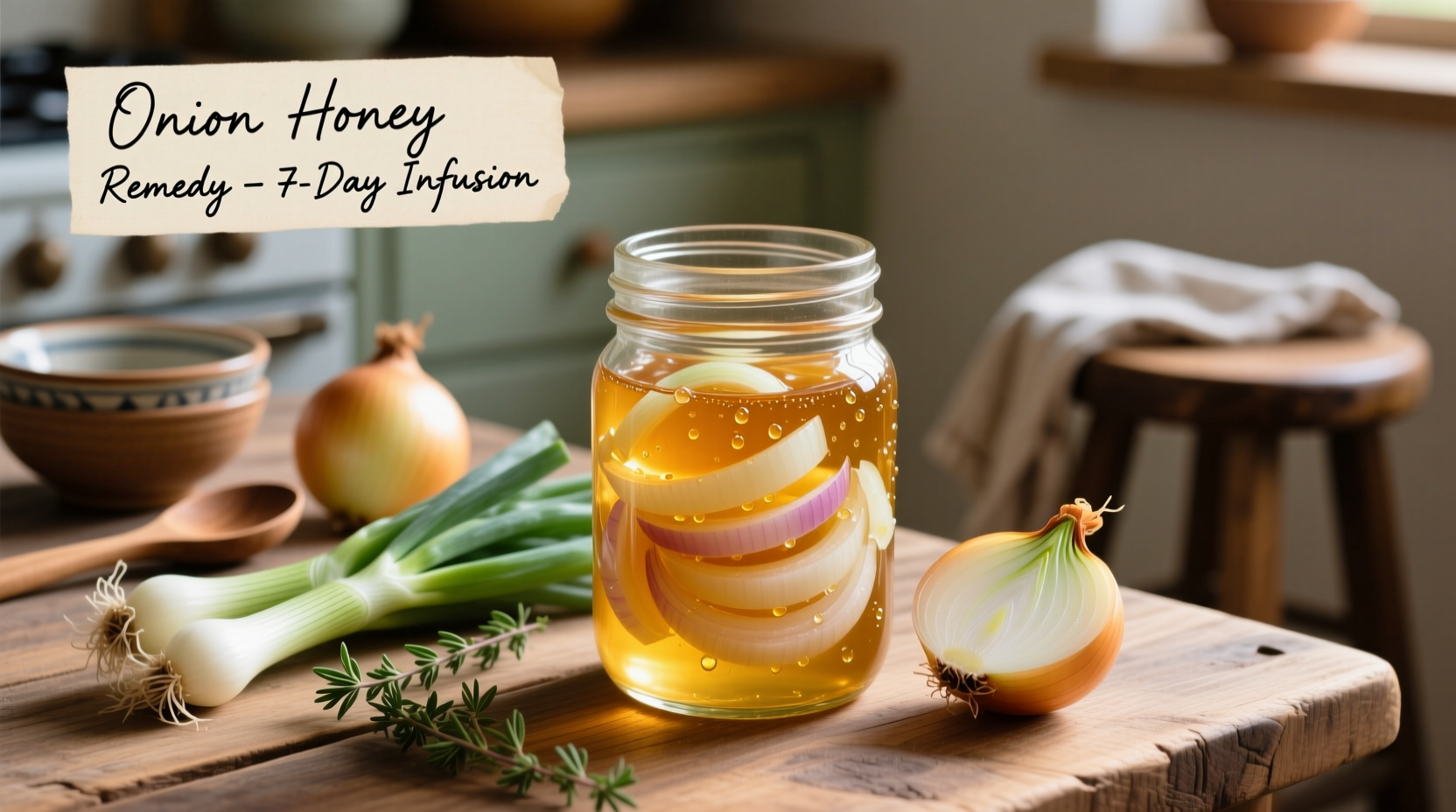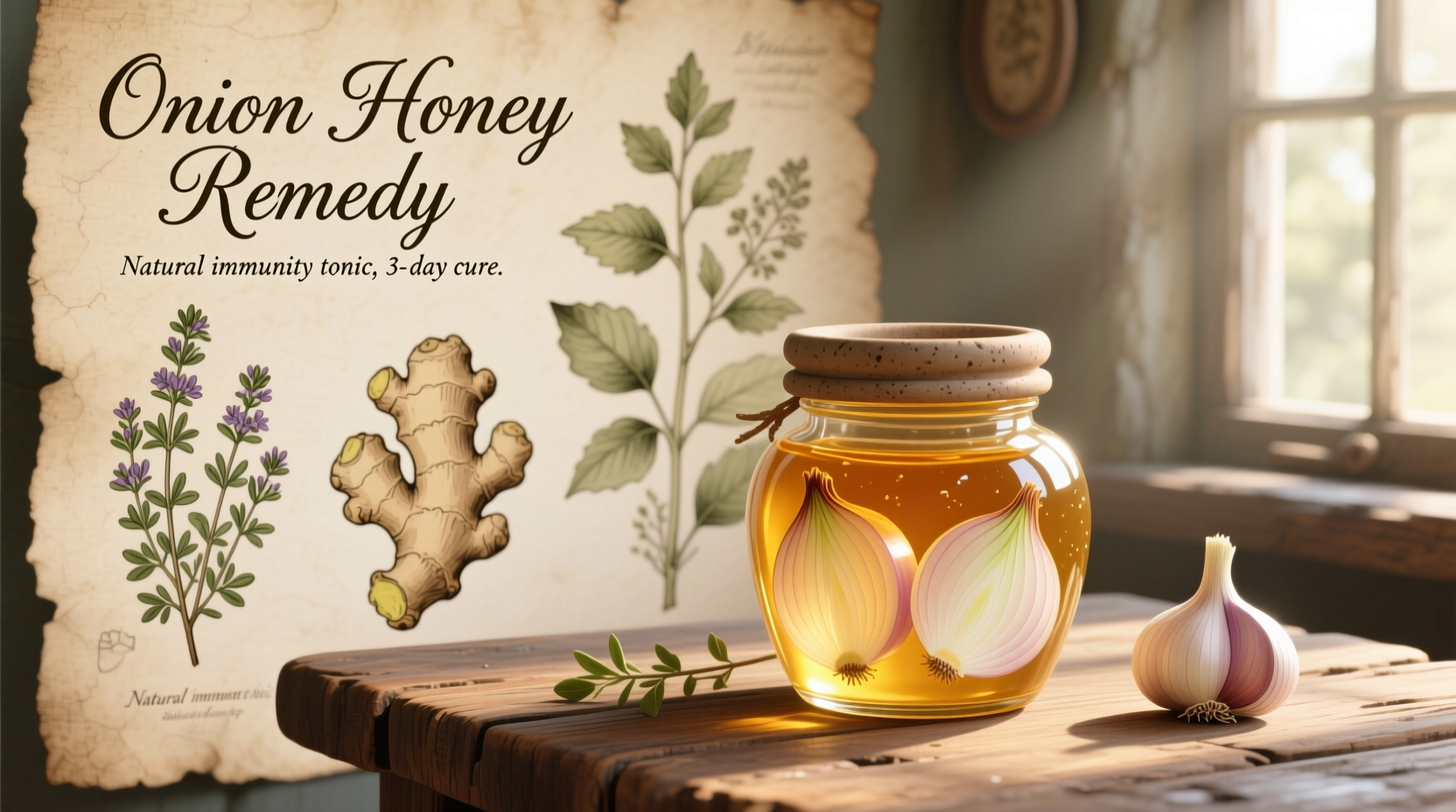Why This Traditional Remedy Endures
For centuries, cultures worldwide have combined onions and honey to ease respiratory discomfort. Modern research validates honey's effectiveness for cough relief, particularly in children over 12 months, while onions provide flavor and minimal additional benefits. This simple preparation remains popular because it's accessible, affordable, and generally safe when used appropriately.
What Science Says About Honey and Onions
Honey has earned recognition from major health organizations for its cough-suppressing properties. A comprehensive NIH study found honey outperformed placebo and some over-the-counter medications for reducing nighttime cough frequency and improving sleep quality in children. The World Health Organization acknowledges honey as a suitable first-line treatment for coughs in children over 1 year old.
Onions contain quercetin and other compounds with mild anti-inflammatory properties, but research shows these provide minimal therapeutic benefit when consumed orally for respiratory issues. Their primary role in this remedy is flavor enhancement and traditional symbolism.
| Remedy Type | Effectiveness for Cough Relief | Age Restrictions | Key Benefits |
|---|---|---|---|
| Honey alone | Proven effective | Not for infants under 1 year | Reduces cough frequency, improves sleep |
| Onion honey mixture | Moderate (primarily from honey) | Not for infants under 1 year | Flavor improvement, traditional comfort |
| Over-the-counter cough medicine | Limited evidence for children | Vary by product | May provide temporary relief |
When This Remedy Works Best: Context Boundaries
Understanding when onion honey remedy is appropriate prevents misuse and ensures safety. This traditional preparation shines in specific scenarios but has clear limitations:
- Ideal for: Mild, persistent coughs accompanying common colds in adults and children over 1 year old
- Most effective: Nighttime coughing that disrupts sleep (take 1/2 to 1 tablespoon before bed)
- Not appropriate: Coughs lasting more than 2 weeks, high fevers, difficulty breathing, or symptoms in infants under 12 months
- Never substitute: For medical treatment of asthma, pneumonia, or other serious respiratory conditions
The Centers for Disease Control and Prevention clearly states that honey should never be given to infants under 1 year due to botulism risk. This critical safety information applies equally to onion honey preparations.
Traditional Preparation Method
Creating authentic onion honey remedy follows time-honored techniques that maximize flavor extraction while preserving honey's beneficial properties:
- Peel and thinly slice one medium yellow onion
- Place slices in a clean glass jar
- Add 1/4 cup raw, unprocessed honey (preferably local)
- Cover jar and let sit at room temperature for 8-12 hours
- Strain mixture, discarding onion solids
- Store syrup in refrigerator for up to 2 weeks
For immediate relief, take 1/2 to 1 tablespoon as needed. The mixture works best when taken undiluted, allowing direct contact with throat tissues. Children over 1 year can take 1/2 teaspoon, while adults may take up to 1 tablespoon.

Historical Timeline of Onion Remedies
This remedy's longevity reflects humanity's enduring search for natural comfort during illness:
- Ancient Egypt (1550 BCE): Onion-based preparations documented in Ebers Papyrus for respiratory ailments
- Greek Era (400 BCE): Hippocrates recommended onions for coughs and breathing problems
- Middle Ages: Monastic medicine combined honey and onions in " electuaries" for throat soothing
- 19th Century: Common household remedy across Europe and North America for cold symptoms
- Modern Era: Honey's efficacy validated by clinical research while onions remain primarily traditional
Practical Usage Guidelines
Maximize benefits while avoiding common mistakes with these evidence-based recommendations:
- Timing matters: Take before bedtime for optimal nighttime cough reduction
- Honey quality counts: Raw, unprocessed honey retains more beneficial compounds
- Storage is crucial: Refrigerate after preparation to maintain potency
- Manage expectations: Provides symptomatic relief but doesn't cure underlying illness
- Monitor reactions: Discontinue if any irritation or allergic response occurs
When to Seek Professional Medical Care
Traditional remedies complement but never replace professional healthcare. Consult a medical provider if you experience:
- Cough lasting longer than 2 weeks
- High fever (over 102°F/39°C) lasting more than 3 days
- Difficulty breathing or wheezing
- Blood in mucus
- Severe throat pain preventing swallowing
The World Health Organization emphasizes that traditional remedies should complement, not replace, evidence-based medical care, particularly for persistent or severe symptoms.
Realistic Expectations for Natural Relief
Onion honey remedy offers gentle, natural comfort for mild respiratory symptoms but works within specific boundaries. Honey provides the primary therapeutic benefit, while onions contribute traditional symbolism and flavor. This preparation won't cure infections or replace necessary medical treatment, but it can provide meaningful symptomatic relief when used appropriately. Understanding both its capabilities and limitations ensures safe, effective use as part of your wellness toolkit.











 浙公网安备
33010002000092号
浙公网安备
33010002000092号 浙B2-20120091-4
浙B2-20120091-4